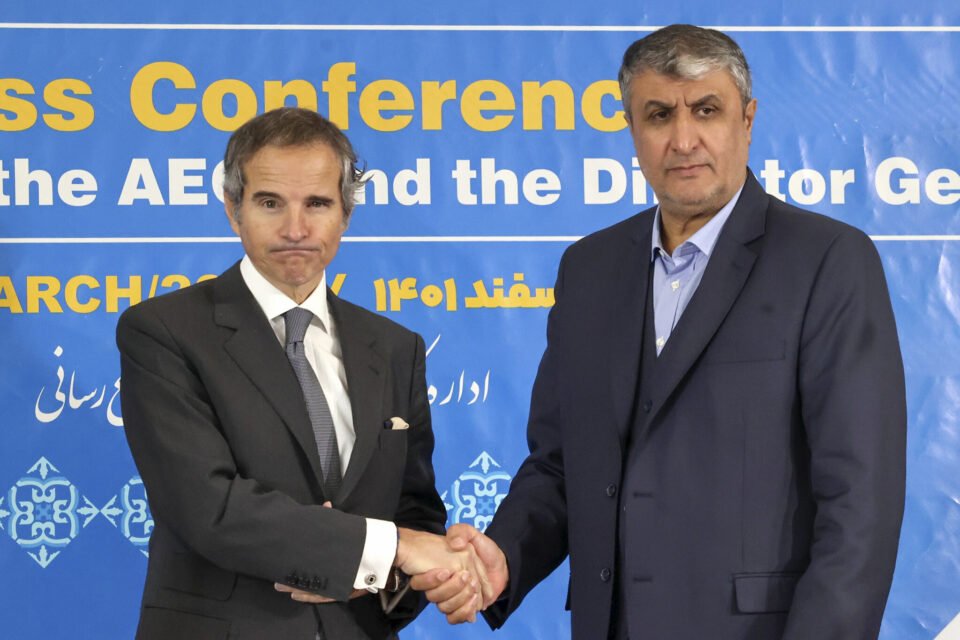Iran promises increased access for inspectors, according to the UN’s nuclear head
During a meeting in Tehran between the head of the UN nuclear agency and top Iranian officials, Iran makes broad commitments to cooperation.
The director of the UN atomic agency claims that Iran has agreed to reconnect cameras and other monitoring equipment at its nuclear installations and speed up inspections.

Rafael Grossi made the declaration on Saturday following a meeting with Ebrahim Raisi, the Iranian president, and other high officials in Tehran.
His visit came just two days before the International Atomic Energy Agency’s (IAEA) 35-nation board of governors’ quarterly meeting and was in response to the discovery of uranium particles at an Iranian subterranean facility that had been nearly weaponized.
Upon his return to Vienna, Austria, the agency’s headquarters, Grossi told reporters that there had been a “decrease in some of the monitoring efforts” including cameras and other equipment “which were not operational” over the previous few months.
“They will resume operation, as we have promised.”

He did not specify what equipment would be returned or when it would happen, but it appeared that he was making a reference to Iran’s removal of security cameras from its nuclear sites in June 2022, during a previous dispute with the IAEA. Not words, this. On the guarantees he obtained in Tehran, Grossi remarked, “This is really concrete.
Following Grossi’s visit, the IAEA and Iran released a joint statement in which they stated that Tehran had “indicated its readiness to… offer further information and access to address the lingering safeguards issues”.
No more information was provided in the statement, but diplomats were quoted by the Reuters news agency as saying that the prospect of a significant improvement in the two countries’ relations would probably prevent the West from pushing for yet another resolution requiring Iran to cooperate.
Grossi “looks forward to… fast and full implementation of the Joint Declaration,” according to a private IAEA briefing to member nations reviewed by Reuters. According to Grossi, who spoke to reporters, Iran should make information, locations, and people accessible.
This would be a significant improvement over the years of Iranian stonewalling. The additional monitoring tools that had been installed as part of the 2015 nuclear agreement but were later taken down last year as the agreement came undone in the wake of the United States’ withdrawal from the agreement in 2018 under then-President Donald Trump would also be permitted to be reinstalled.
In terms of knowledge continuity, “this is very, very significant,” according to Grossi, “particularly in the context of the prospect of the revival of JCPOA,” which is the name given to the 2015 agreement on Iran’s nuclear program. IAEA and Iranian officials would hold additional discussions in Iran “very, very soon” to work out the specifics, according to Grossi.
The IAEA director arrived in Iran on Friday, but negotiations to revive the 2015 agreement between Iran and major nations that offered Tehran respite from harsh economic sanctions in exchange for limits on its nuclear operations had reached a standstill.
Earlier this week, a classified IAEA report stated that uranium particles with an enrichment level of up to 83.7 percent had been found at Iran’s underground Fordow plant, which is located about 100 kilometers (62 miles) south of Tehran. This level of enrichment is just shy of the 90 percent required to produce an atomic bomb.
Reporters were informed by Grossi that the IAEA required to conduct further inspections of the site and that Iran has consented to “50 percent more inspections” there.
Iran claims that it has not attempted to enrich uranium above 60 percent purity and denies having any desire to build nuclear weapons. But “unintended fluctuations… may have happened,” according to the Iranian authorities, during the enrichment procedure.
Once Iran significantly altered a connection between two clusters of centrifuges that are used to enrich uranium without disclosing it to the IAEA, the modification was discovered.
If Iran implemented the most recent agreement, “it would be very beneficial to the negotiations,” according to Miles Pomper, senior fellow at the Washington, DC, office of the Center for Non-Proliferation Studies.
“They could do a lot to revive expectations for the deal if they actually allowed IAEA inspectors to visit those facilities and provide answers,” he told Al Jazeera.
He added, “I’m skeptical,” though.
“So, we’ll have to watch if the Iranians just kind of drag it out to escape censure at the IAEA or if they’re serious for a change,” said the author.
According to Dorsa Jabbari of Al Jazeera, who is now in Tehran, Grossi’s visit and Iranian commitments to permit inspections of the Fordow nuclear site and access to senior officials have stoked optimism that a protracted impasse can be broken.
“That appears to be a step in the right direction we see being taken by Iranian officials to strengthen their cooperation with the agency and to move forward and get away from this deadlock that they’ve had with the agency for almost two years,” she added.
Nonetheless, doubt persisted.




